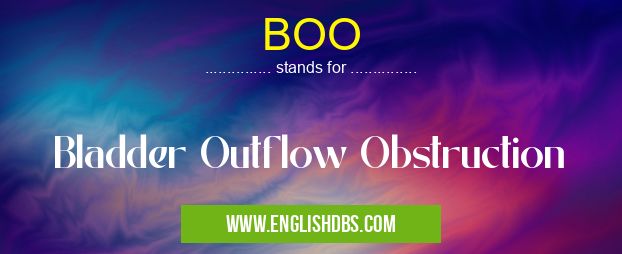What does BOO mean in NURSING
BOO stands for Bladder Outflow Obstruction, a medical condition characterized by the blockage of urine flow from the bladder. This obstruction can be caused by various factors, including an enlarged prostate, urethral stricture, or bladder stones.

BOO meaning in Nursing in Medical
BOO mostly used in an acronym Nursing in Category Medical that means Bladder Outflow Obstruction
Shorthand: BOO,
Full Form: Bladder Outflow Obstruction
For more information of "Bladder Outflow Obstruction", see the section below.
Introduction: Bladder Outflow Obstruction (BOO)
Causes
- Enlarged Prostate: The most common cause of BOO in men is an enlarged prostate, which can press on the urethra and restrict urine flow.
- Urethral Stricture: This is a narrowing of the urethra, the tube that carries urine from the bladder to the outside.
- Bladder Stones: Stones can form in the bladder and block the opening of the urethra, preventing urine from flowing out.
Symptoms
The symptoms of BOO can vary depending on the severity of the obstruction. Common symptoms include:
- Difficulty starting to urinate
- Weak urine stream
- Frequent urination
- Urgency to urinate
- Incomplete emptying of the bladder
- Pain or discomfort during urination
Diagnosis
Diagnosing BOO usually involves a physical examination, a urinalysis, and imaging tests such as an ultrasound or cystoscopy.
Treatment
Treatment for BOO depends on the underlying cause and severity of the obstruction. Options may include:
- Medication: Medications can help relax muscles in the bladder and improve urine flow.
- Surgery: Surgical procedures can be used to remove obstructions, such as an enlarged prostate or bladder stones.
- Urethral Dilation: This involves widening the narrowed urethra using a balloon catheter.
Essential Questions and Answers on Bladder Outflow Obstruction in "MEDICAL»NURSING"
What is Bladder Outflow Obstruction (BOO)?
BOO is a condition in which urine flow from the bladder is obstructed. It can occur due to various causes, such as an enlarged prostate, bladder stones, or urethral stricture.
What are the symptoms of BOO?
Symptoms may include frequent urination, difficulty starting urination, weak urine stream, or a feeling of incomplete bladder emptying. Pain or burning during urination can also occur.
How is BOO diagnosed?
Diagnosis involves a physical exam, medical history, and tests such as a urine analysis, uroflowmetry (measuring urine flow rate), or imaging studies like an ultrasound or CT scan.
How is BOO treated?
Treatment depends on the underlying cause. Options may include medications to relax the bladder muscles, minimally invasive procedures to remove blockages, or surgery in severe cases.
What are the potential complications of BOO?
Untreated BOO can lead to bladder damage, kidney problems, or urinary tract infections. In severe cases, it can cause complete urinary retention, requiring urgent medical intervention.
Can BOO be prevented?
While some causes of BOO are unavoidable, certain lifestyle factors can reduce the risk. These include maintaining a healthy weight, avoiding excessive alcohol consumption, and staying hydrated.
Is BOO a serious condition?
The severity of BOO depends on the underlying cause and the extent of the obstruction. While it can be uncomfortable and affect daily life, timely diagnosis and treatment can help prevent serious complications.
Final Words: Bladder Outflow Obstruction (BOO) is a condition that can significantly impact urinary function. Early diagnosis and treatment are essential to prevent complications and improve symptoms. By understanding the causes, symptoms, and available treatments, individuals can make informed decisions about managing this condition.
BOO also stands for: |
|
| All stands for BOO |
